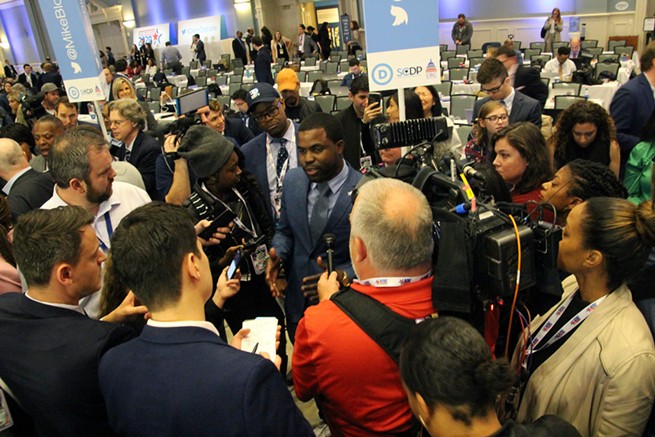
By Andy Brack, editor and publisher | Halfway through the nationally-aired South Carolina presidential debate on Feb. 25, the television got turned off. Too much bickering. Too little substance. Too much crosstalk.
 There’s got to be a better way for voters to get information than big spectacles where candidates have 75 seconds to answer direct questions and challengers can pipe in for only a few seconds. More serious discussion is needed.
There’s got to be a better way for voters to get information than big spectacles where candidates have 75 seconds to answer direct questions and challengers can pipe in for only a few seconds. More serious discussion is needed.
From a production standpoint, CBS did a beautiful job in transforming the Charleston Gaillard Center into a red-white-and-blue presence that looked great and felt right. But what went wrong during South Carolina’s moment in the spotlight was the format and how moderators didn’t moderate. A few observations:
Microphones have off buttons. During particularly frenzied or tense moments during the two-hour debate, candidates started interrupting and yelling to get words in edgewise, which led mostly to chaos. At one point, former Vice President Joe Biden questioned whether rules would be enforced, asking, “Can we just speak up when we want to?”
At that moment moderators Norah O’Donnell and Gayle King should have stopped the debate, turned off the microphones and warned candidates that only one microphone “hot” or on at a time if the crosstalk continued. (That’s the magic of electronic media — microphones can be turned off.) Candidates would have settled down and a sense of decorum would have returned.
Better moderators. The moderators just didn’t control the debate. They seemed to be out of their element, letting candidates run the show, which is why it often seemed like organized chaos. In the future, perhaps professional, trained moderators who know how to run debates, not television anchors, should be in charge. It also wouldn’t have hurt if a local reporter or two had been part of the panel of questioners.
Better questions. The Charleston debate was for a national audience, especially since the Feb. 29 primary is to be followed March 3 by Super Tuesday voting in 14 states. In Charleston, where a mayor’s race hyper-focused in November on flooding and climate change, it was telling there were no questions about either — in a campaign where climate is getting more and more attention.
So what’s an alternative to the debate nonsense? How about this: Instead of a fancy show that costs lots of money, how about giving a few minutes of unrestricted television time to candidates to share whatever they want in prime time, followed by live or videotaped short answers to three or four questions from the national and local media?
If, for example, each early voting state had a debate in this format, each candidate could address the national audience on big issues in a 5-minute statement, which would be a short version of a stump speech. Then the forum host could have reporters ask short regionally- or locally-focused questions for candidates to give 1-minute answers.
Such a format would keep the broadcast from going on forever and it could be paid for with commercial breaks. Had each candidate in Charleston been handled without the big debate spectacle through this proposed format, the whole prime-time show would have lasted 70 minutes, not two hours. Furthermore, the broadcaster could have still had a big “spin room” where candidates, surrogates and staff were interviewed after statements and answers to give context to what people heard.
Such a new, engaged format would, in and of itself, encourage participants to pay attention to issues and discourage cacophonic attacks on other candidates. Moderators wouldn’t really have anything to moderate and would, instead, be able to focus on asking questions of candidates to extract answers that shine lights on more issues. And voters might learn more in one sitting about a variety of candidates than they could in spending hours doing online research or going to rallies.
It’s hard enough to figure out which candidate might be best for the country without having to sift through noise, crosstalk and too much yelling. Political parties and candidates need a better way to engage voters in prime time. Some free TV time mixed with answers to probing questions might be just the ticket. Doing things the same way in the future is going to lead to more disasters.
- Have a comment? Send to: feedback@statehousereport.com.



Yes, a well-specified format helps keep the rating directed moderators doing their job. Better selection of debate moderators would help. Moderators permitting mayhem should not be given a chance to repeat. A crawl disclaimer running across the bottom of the TV screen should say, “Debate performance does not predict future performance.”
Hello Andy,
My generally conservative/libertarian views often have us at odds, but I absolutely agree with you on this one. We don’t have debates. We have sound bite contests. These candidates come in with a small list of bullet points geared towards being shared on TV and online. What we have seen this year is farcical.